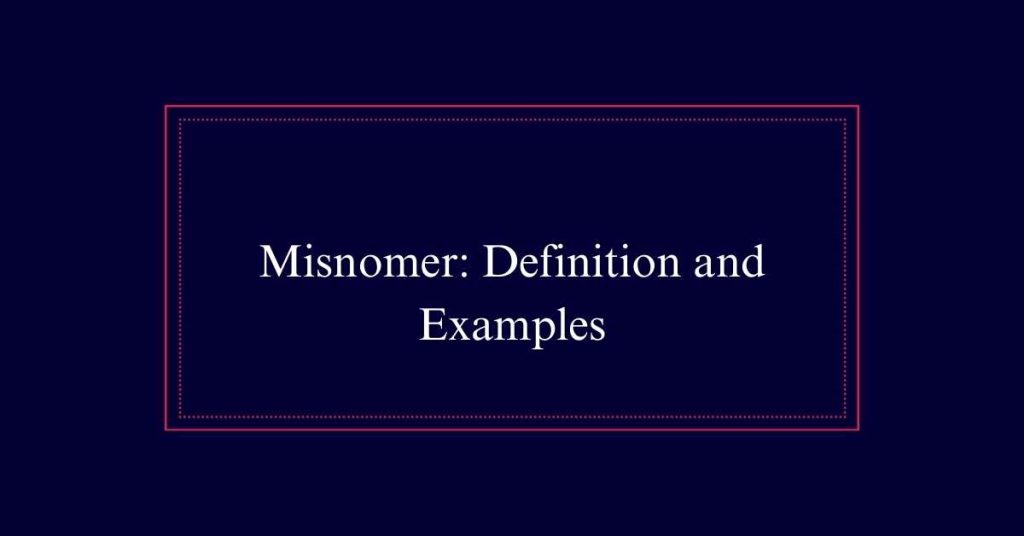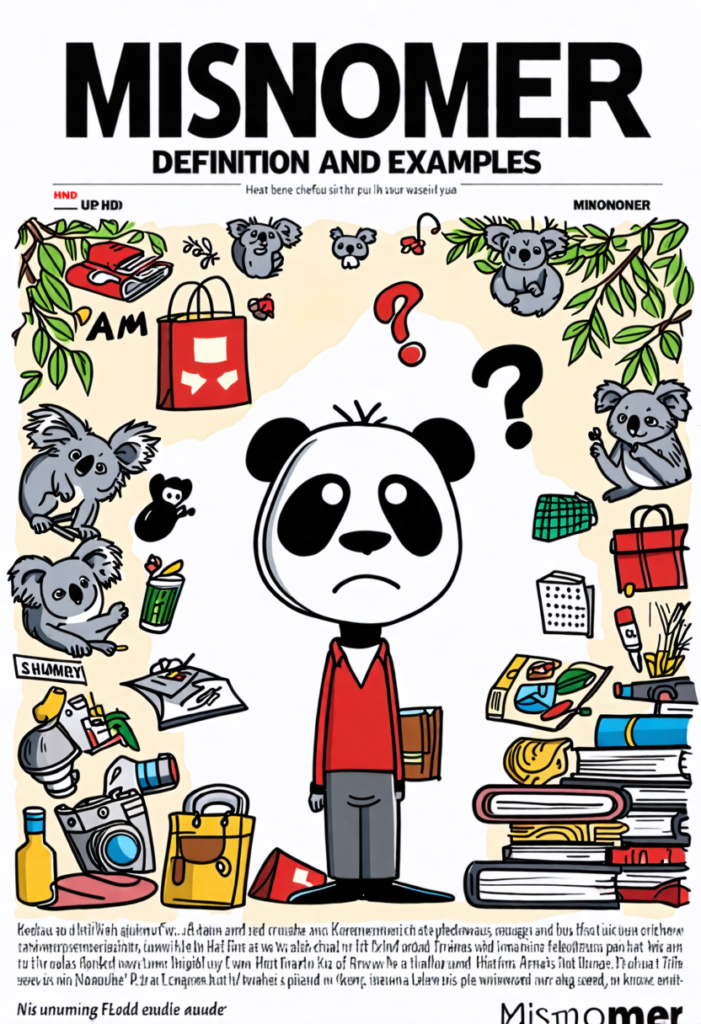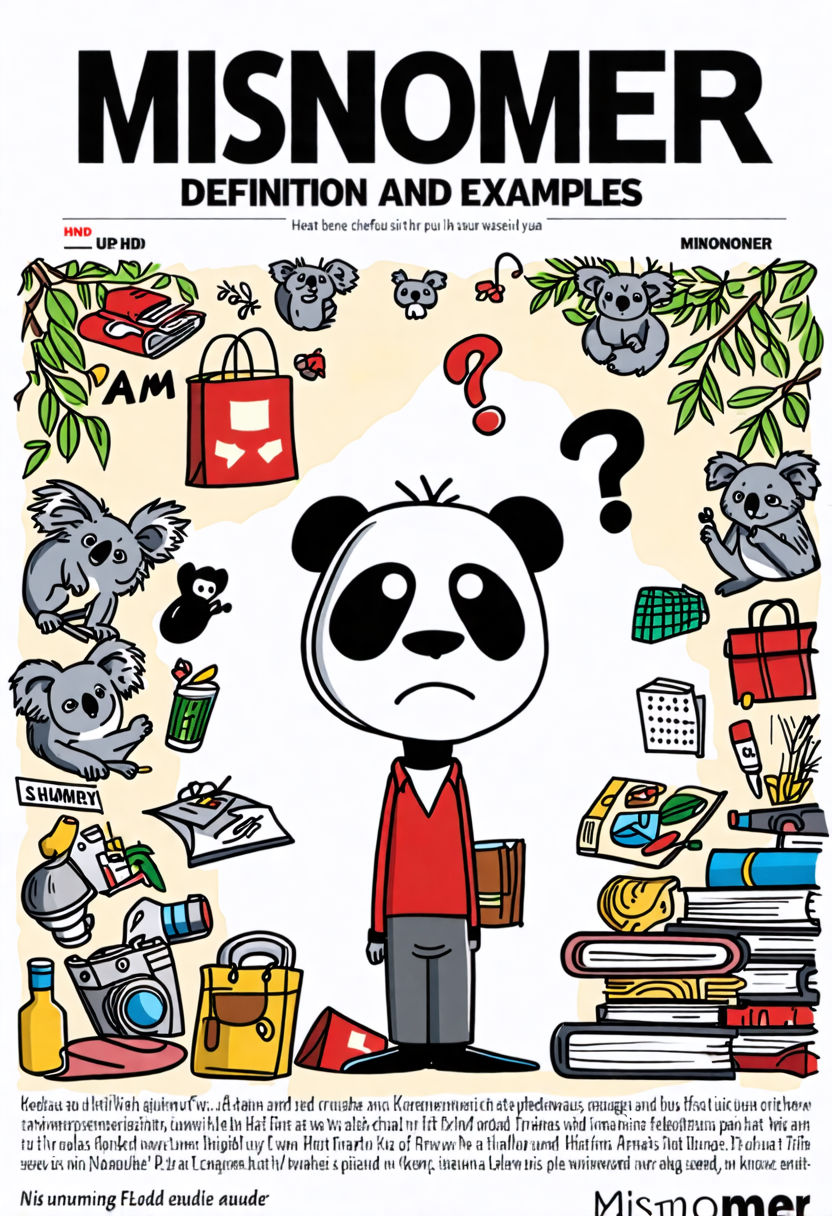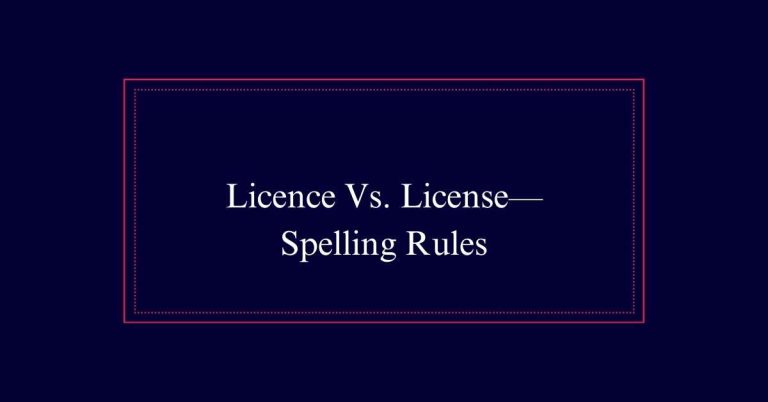Misnomer: Definition and Examples
A misnomer is a term that inaccurately describes or misrepresents what it refers to. Originating from Old French ‘mesnomer,’ meaning to name wrongly, it combines ‘mes’ (wrong) and ‘nomer’ (to name). Common examples include ‘French fries,’ which originate from Belgium, and ‘funny bone,’ which refers to a nerve, not a bone. Misnomers can arise from historical inaccuracies or simple misunderstandings. They differ from misconceptions, which are incorrect beliefs.
What Is a Misnomer?
A misnomer is a term or name that inaccurately describes or misrepresents what it refers to. It is a specific kind of mistake, where the given name does not fit the actual nature of the item or concept.
For instance, the name ‘French fries’ is a misnomer because they originated in Belgium, not France. Another example is the ‘funny bone,’ which is not a bone but a nerve. Misnomers can arise from historical inaccuracies, changes over time, or simple misunderstandings.
Recognizing a misnomer is crucial to guarantee accurate communication. This concept is distinct from misconceptions, which are based on faulty reasoning, and from malapropisms, where similar-sounding words are confused. Misnomers are prevalent in various fields, from history to everyday language.
Etymology of Misnomer
The term ‘misnomer’ originates from the Old French word ‘mesnomer,’ meaning to name wrongly. This word is composed of ‘mes,’ a prefix indicating wrong or bad, and ‘nomer,’ derived from the Latin ‘nominare,’ meaning to name or nominate.
The prefix ‘mis’ is commonly used in English to signify errors or incorrect actions, as seen in words like mistake, misuse, and misplacement. As a result, a ‘misnomer’ specifically refers to a name or designation that is incorrect or misleading. Its usage highlights a mistake in naming rather than general inaccuracies.
Misnomer Vs. Misconception
Understanding the etymology of ‘misnomer’ helps differentiate it from the term ‘misconception’. A misnomer refers to a name or title that is incorrect or inappropriate for the entity it describes. It stems from the Old French ‘mesnomer’, meaning to name wrongly.
Conversely, a misconception is a faulty belief or opinion formed due to poor understanding or reasoning. While a misnomer is about incorrect naming, a misconception involves incorrect thinking. For instance, calling a peanut a nut is a misnomer; it’s actually a legume. However, believing that humans use only 10% of their brains is a misconception.

Common Misnomers
How often do we encounter names and terms in everyday life that are actually misnomers? Surprisingly frequently.
For example, French fries aren’t French; they originated in Belgium. The funny bone isn’t a bone but a nerve named the ulnar nerve. Another common misnomer is the name ‘koala bear’ for the koala, which is not a bear but a marsupial. Similarly, the name ‘peanut’ suggests it is a nut, but it is actually a legume.
Even everyday items like ‘tin foil’ are misnomers, as it is now made from aluminum, not tin. These examples show how names can persist even when they no longer accurately describe the item or concept.
Misnomers are everywhere, reflecting historical origins and evolving language.
Historical Misnomers
Examining historical misnomers reveals how names can persist despite their inaccuracies, often due to historical events and misunderstandings.
For instance, the Hundred Years’ War is a notable misnomer. It lasted 116 years, but the name persists.
Another example is the Battle of Bunker Hill, which was actually fought on Breed’s Hill. These errors often stem from early reports or miscommunications. They become fixed in collective memory and are rarely corrected.
The term ‘Vikings’ is also a misnomer as it originally referred to a specific activity, not the people.
Historical misnomers highlight how inaccuracies can become ingrained, shaping our understanding of history despite their initial errors. They reflect the complexities of recording and remembering the past accurately.
Cultural Misnomers
Cultural misnomers often arise from misunderstandings, stereotypes, or historical inaccuracies that become accepted over time. These misnomers can perpetuate incorrect ideas about a culture or community.
For instance, the term ‘Eskimo’ is widely used but is considered a misnomer by Inuit people, as it inaccurately describes their diverse groups. Another example is the ‘Chinese checkers’ game, which actually originated in Germany, not China.
Similarly, the term ‘Indian’ to describe Native Americans is a historical misnomer that arose from early explorers’ geographical mistakes. These misnomers can lead to misconceptions and reinforce outdated or incorrect beliefs.
Understanding and correcting these terms is essential for fostering accurate cultural representation and respect.
Misnomers in Language
Misnomers in language often occur when words or phrases are used inaccurately, leading to confusion and misunderstanding. These linguistic errors can be common in everyday speech, literature, and even legal documents. For instance, calling a koala a ‘koala bear’ is a misnomer since koalas are marsupials, not bears. Misnomers can also arise from historical contexts or shifts in meaning over time. Understanding these inaccuracies is essential for clear communication. Below is a table highlighting some common misnomers in language:
| Misnomer | Correct Term | Reason |
|---|---|---|
| Koala bear | Koala | Koalas are marsupials |
| Jellyfish | Sea jelly | Not a fish |
| Peanuts | Groundnuts | Not true nuts |
| Coffee beans | Coffee seeds | Seeds, not beans |
Recognizing misnomers helps in achieving more precise language use.
Misnomers in Technology
In the field of technology, misnomers frequently lead to misconceptions and confusion. For instance, the term ‘smartphone’ is somewhat misleading. These devices are not inherently intelligent; they rely on pre-programmed software and user input.
Another example is ‘Wi-Fi,’ which stands for ‘Wireless Fidelity.’ This term suggests a level of precision akin to ‘High Fidelity’ audio, which isn’t accurate.
Similarly, ‘Flash drive’ implies the use of flash photography, but it actually refers to flash memory.
Lastly, the term ‘bug’ in software doesn’t refer to insects but to errors or flaws in code. These misnomers can create misunderstandings, especially for those new to the field, emphasizing the importance of clear and accurate terminology.








